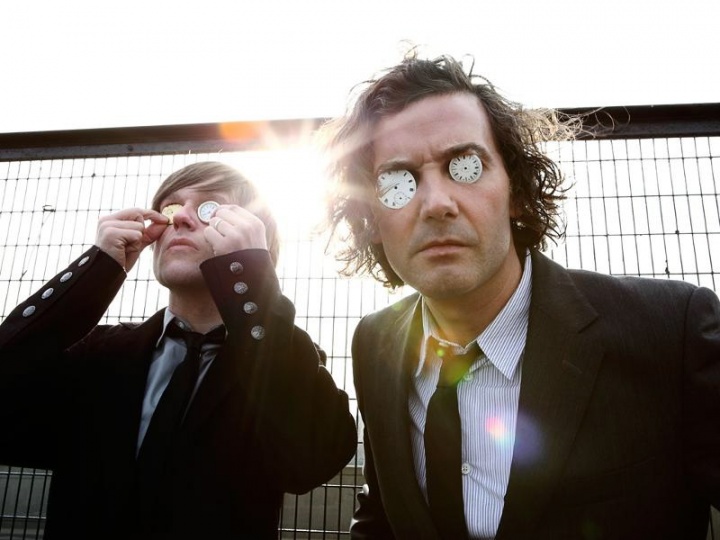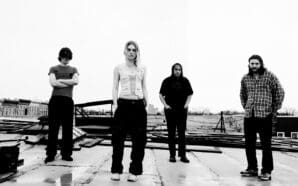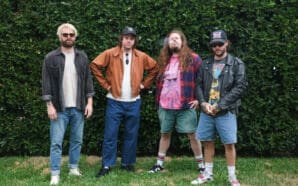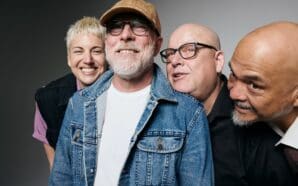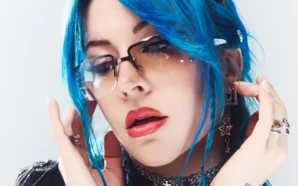Noel Gallagher’s High Flying Birds recently made their US debut at Philthy’s own Academy of Music. The one half of the core of Oasis serenaded the country’s oldest operating opera house with a handful of the band’s classics, along with his slightly-more-psychedelic recent output. However, Noel wasn’t the only hero of Brit Pop who was in the room that night. Opening the show was The Hours, fronted by Antony Genn, a less-celebrated, but arguably no-less-important factor in the movement. Genn joined Pulp when he was 16 and later went on to play with Elastica (along with countless co-writing credits). The Hours are led by Genn and Martin Slattery, who met when they were part of Joe Strummer’s Mescaleros.
While The Hours certainly aren’t devoid of the Brit Pop aesthetic, their sound is certainly more reminiscent of that left in the ashes of the movement (a little more humble, a little more delicate, a little more sober), along with a distinct nod to Post-Punk. The band are currently touring behind their first US release (which is comprised of songs from their first two European releases), It’s Not How You Start, It’s How You Finish, which dropped last October. The band’s seven-song set highlighted this release. Most noteworthy were downplayed anthem “Ali in the Jungle,” the coyly poetic “Narcissus Road,” and “Murder or Suicide,” a song as dynamically sprawling as the question its title poses, which packs the drama, tension, fear, and hope of a two-hour blockbuster into just over five minutes. The theatre wasn’t quite packed for The Hours, but it was at at least half-capacity and those there seemed quite intent on hitting up the merch table after their set.
I recently got a chance to chat with Genn about Britpop’s legacy, the difference in US and UK audiences, and, yes, even Occupy. Check out what he had to tell me.
Izzy Cihak: Your first US release is called It’s Not How You Start, It’s How You Finish. What, exactly, do you mean by that phrase?
Antony Genn: I mean that no matter what kind of odds are against you, it ain’t over till the fat lady sings. I mean that whatever cards you are dealt, you can sometimes play those cards against a way better hand and win. I mean that whatever doesn’t kill you makes you stronger…WAY STRONGER! And I mean that it really doesn’t matter what the world thinks, you gotta aspire to, succeed on your own terms…whatever they may be. Life is short, but we are all capable of exceeding our own expectations if we dig in and believe. I’m gonna play the whole 90 mins. Plus stoppages.
IC: You say “We believe it’s always time for a change. It’s time to break the cycle, turn over onto a fresh page.” What change are you hoping for?
AG: I am hoping that the world wakes up and that the 99% stops allowing the 1% to decide how we can live. I love all this Occupy stuff. Power to the people!!
IC: You’re quite a prominent figure in the “Britpop” movement and British music in general. However, contemporary US audiences don’t seem terribly familiar with that portion of musical history. Do you feel there is a difference in the way that the Yanks receive your aesthetic, compared to British audiences? (I’m actually a HUGE fan of Elastica and Pulp but, because of my age, I missed your stints in each band.)
AG: I think in America you seem to appreciate craft…bands that can write songs and play live like they mean it. British audiences appreciate that too but often the media are obsessed with fashion. A band can be hip if they look cool or are part of a scene despite not having any musical substance. I think in the states you gotta be able to get up and do it and that’s the bottom line. We can and we do. We are obsessed with music. It can be an awesomely powerful thing.
IC: Are there any contemporary musical scenes or movements that you feel are especially inspired by Britpop, or anyone that you feel to be contemporary equivalents?
AG: Not really, to be honest with you, but I’m not big on looking at the past. Britpop happened and was an awesome thing to be right in the thick of cos the energy and power of the music was undeniable. But a scene is only as good as the music and the music was pretty amazing. Oasis and Pulp and Blur and Elastica all had one thing in common….great songs. If you ain’t got that, you ain’t got nothin’. Scenes are only good when they are organic, but they’re usually almost over by the time people start taking notice in the press! They say punk lasted a hundred days, but the ethic of punk will last forever!
IC: Damien Hirst, a very famous visual artist, has done a lot of your most famous imagery and one of your most famous songs is “Ali in the Jungle.” It’s obvious that you have a lot of significant non-musical influences, which I always find to be far more interesting than a band’s musical influences. Do you have any other especially prominent non-musical influences which you think would be worth your fans checking out?
AG: Well, I am just a fan of people that have balls and believe in what they do. That can be in art, sport, film or politics or people who give their lives to the service of others. I’m not really impressed by money. I love mavericks who like to ignore the mainstream and follow their own path. I recently went to see the Gerhard Richter exhibition in London. He is the GREATEST living painter! And I saw the documentary Senna, about the formula 1 driver, Ayrton Senna. I have no interst whatsoever in F1, but that documentary is AWESOME!!! Senna was so full of life, so passionate, and so totally committed. He was an inspiring man. I saw the movie 3 times and cried every time!
IC: You’re currently touring with Noel Gallagher. How did that relationship begin?
AG: Noel is a master craftsman. When he plays that acoustic guitar and sings it’s like watching a cast iron legend like Paul Simon or Neil Young. I met him back in the Britpop years and he was exactly the same then-he’s his own man and lives on his own terms, has balls of steel, and is probably the funniest man in music. He asked us to open for him and when Noel asks you say “Yes!”




